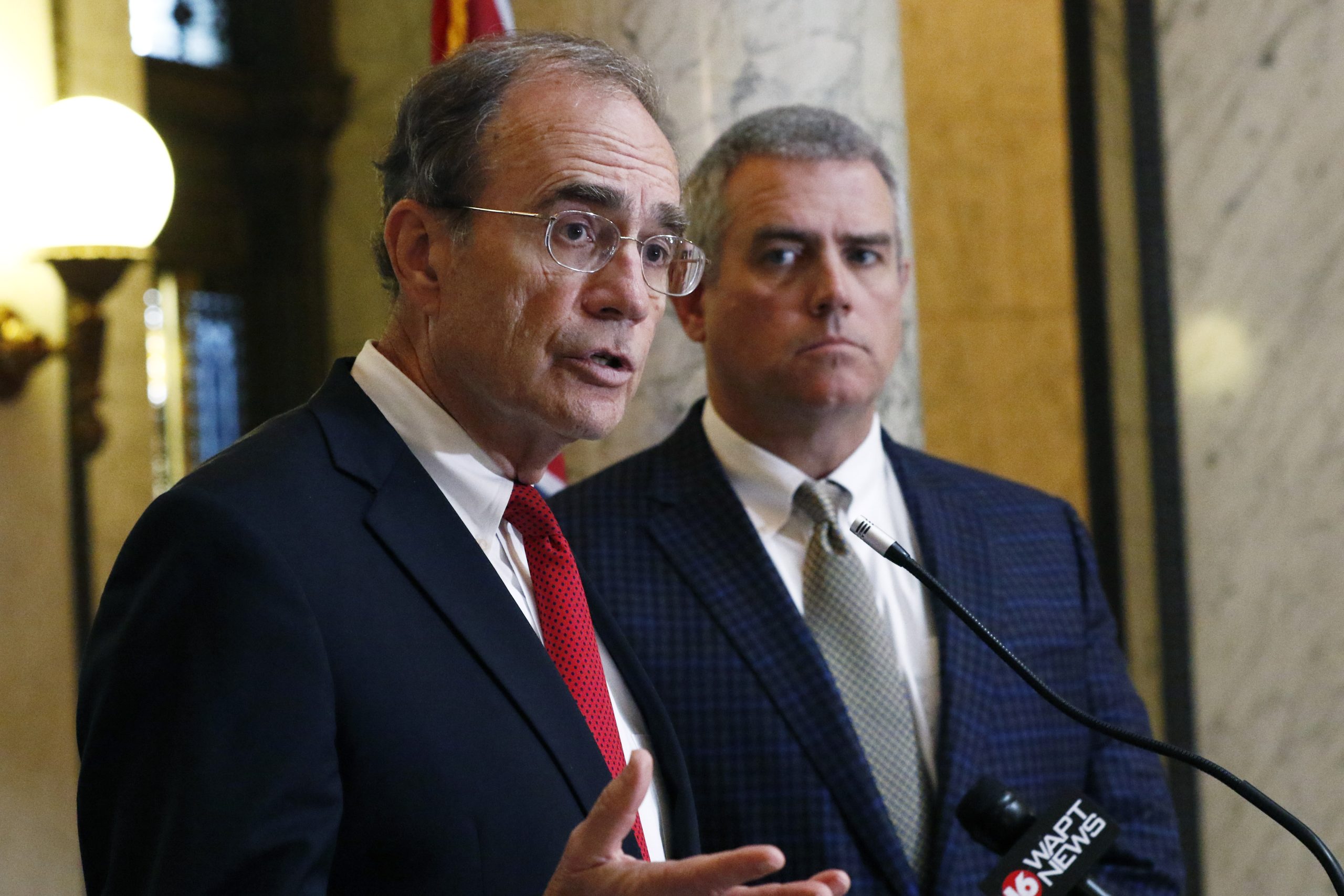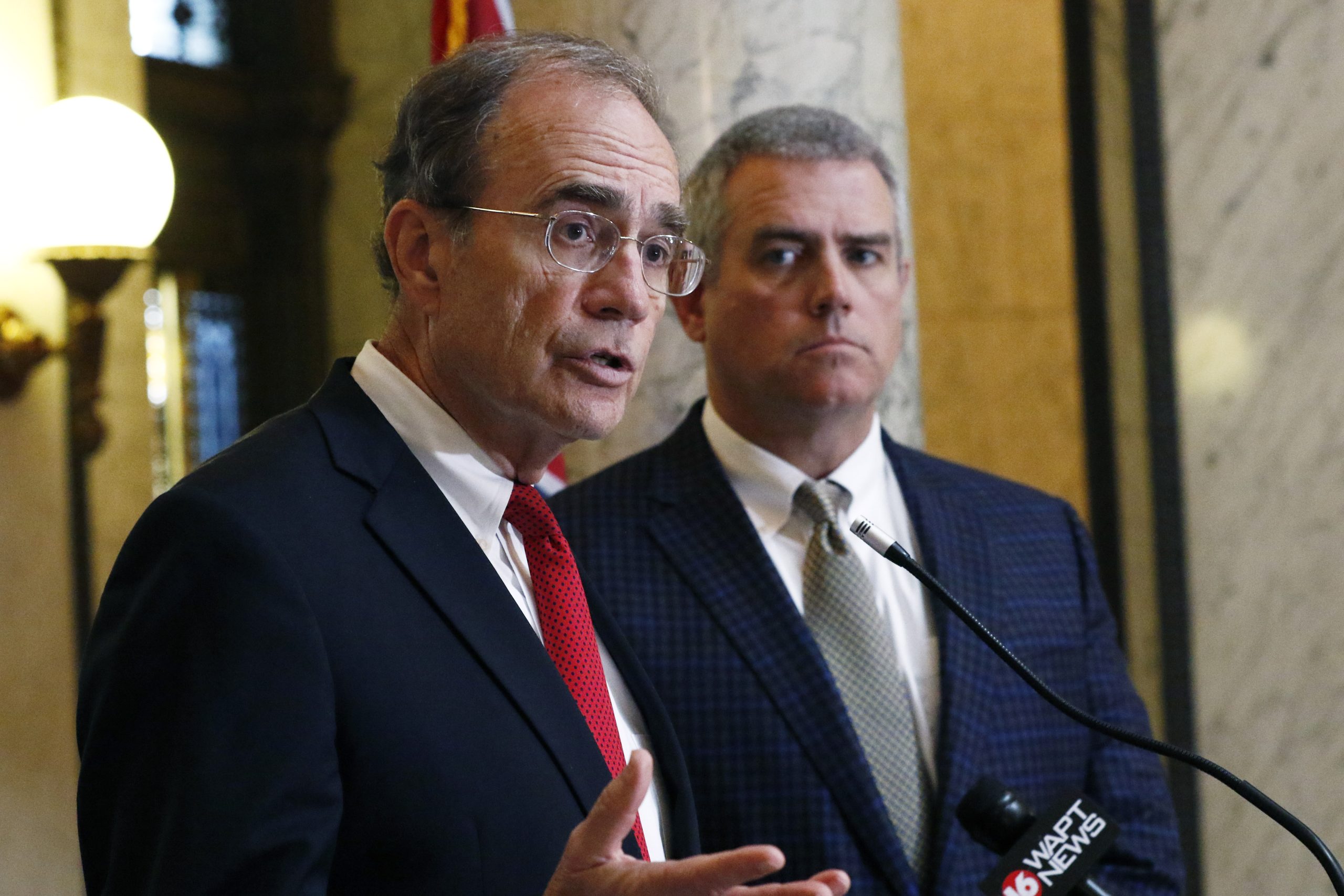Mississippi Today
MAEP full funding fight could be renewed in Legislature


MAEP full funding fight could be renewed in Legislature
For 56 days of the 90-day 2023 session of the Mississippi Legislature and before then in the pre-session budgeting work, no one was speaking publicly or seriously about the possibility of fully funding public education.
But in a remarkable move on the 57th day, Senate Education Chair Dennis DeBar, R-Leakesville, announced his goal for the 2023 session is to fully fund the Mississippi Adequate Education Program, which provides the state’s share of the basics to operate local school districts.
Such talk had not occurred in earnest since the 2000s when Democrats still controlled the Mississippi House. At that time, it was those House Democrats calling for MAEP to be fully funded or at least provided additional funding. And it was Republican leaders of the Senate and Republican Gov. Haley Barbour opposing full funding.
This time around it could be the House leadership — in the form of Republican Speaker Philip Gunn — opposing full funding. Gunn has long been an opponent of fully funding MAEP, and the issue of full funding could again become a contentious one just as it used to be in earlier days.
But make no mistake about it: DeBar would not have uttered the words “full funding” without the blessings of Republican Lt. Gov. Delbert Hosemann, who presides over the Senate. DeBar is loyal to Hosemann.
DeBar made his pronouncement with the caveat that the MAEP formula would need to be “tweaked” as part of the full funding effort. Those tweaks could theoretically result in the need for less money to fully fund MAEP. But education advocates have generally trusted DeBar to make decisions they believe are in the best interest of public schools.
MAEP was passed by the Legislature in 1997 over a gubernatorial veto and was phased in over six years. It was fully funded during the phase-in period and during the 2003 session – the first of full enactment.
It was not fully funded again until 2007, when Barbour acquiesced to House Democrats and agreed to full funding. Interestingly, Barbour and others campaigned for election later that year proclaiming the fight over full funding of MAEP was over. It would take only a minimal increase each year to maintain full funding. And it was fully funded again in the 2008 session, but Barbour cut MAEP funding later that year and then reduced funding for most agencies because of the so-called Great Recession that resulted in a dramatic slowdown in state tax collections.
MAEP has not been fully funded again since then. But it has not been from lack of effort from those outside of the Legislature.
Former Gov. Ronnie Musgrove, who was one of the architects of the Adequate Education Program that was enacted during his tenure as lieutenant governor, sued the Legislature in 2015 on behalf of a group of school districts saying that the law mandated full funding.
The Supreme Court, in a word salad ruling, said just because the law said the Legislature “shall” fully fund MAEP did not mean that the Legislature, well, shall fully fund MAEP.
And about that time a group of education advocates gathered the signatures to place on the ballot an initiative that would have strengthened the state’s commitment to public education, presumably putting more pressure on the Legislature to provide full funding. That proposal was narrowly defeated at the polls in 2015, thanks in part to the fact that the Legislature put an alternative proposal on the ballot to confuse voters.
After that 2015 defeat, Gunn and then-Lt. Gov. Tate Reeves went to work to scrap the MAEP funding formula. With both of the chambers’ presiding officers supporting the effort, most believed MAEP’s days were numbered.
But lo and behold, the effort of Reeves and Gunn failed.
In the ensuing 2019 election, no candidate, including Reeves who won the gubernatorial election nor Gunn’s House Republican candidates, ran on the issue of repealing MAEP.
On the other hand, there also was not much talk about the full funding of MAEP, which provides a base level of state funding for all school districts with more funding for less affluent or property poor districts. Despite unprecedented revenue growth, MAEP was underfunded $273 million during the 2022 session and has been underfunded $3.3 billion since 2008.
But going into the 2023 elections and with Gunn serving as a lame duck speaker not running for reelection, talk of full funding for the Mississippi Adequate Education Program has resurfaced.
That will make some happy and others mad, but it will continue a battle that has been ongoing for decades.
This article first appeared on Mississippi Today and is republished here under a Creative Commons license.
Did you miss our previous article…
https://www.biloxinewsevents.com/?p=210848
Mississippi Today
On this day in 1977, Alex Haley awarded Pulitzer for ‘Roots’

April 19, 1977

Alex Haley was awarded a special Pulitzer Prize for “Roots,” which was also adapted for television.
Network executives worried that the depiction of the brutality of the slave experience might scare away viewers. Instead, 130 million Americans watched the epic miniseries, which meant that 85% of U.S. households watched the program.
The miniseries received 36 Emmy nominations and won nine. In 2016, the History Channel, Lifetime and A&E remade the miniseries, which won critical acclaim and received eight Emmy nominations.
This article first appeared on Mississippi Today and is republished here under a Creative Commons Attribution-NoDerivatives 4.0 International License.![]()
Mississippi Today
Speaker White wants Christmas tree projects bill included in special legislative session

House Speaker Jason White sent a terse letter to Lt. Gov. Delbert Hosemann on Thursday, saying House leaders are frustrated with Senate leaders refusing to discuss a “Christmas tree” bill spending millions on special projects across the state.
The letter signals the two Republican leaders remain far apart on setting an overall $7 billion state budget. Bickering between the GOP leaders led to a stalemate and lawmakers ending their regular 2025 session without setting a budget. Gov. Tate Reeves plans to call them back into special session before the new budget year starts July 1 to avoid a shutdown, but wants them to have a budget mostly worked out before he does so.
White’s letter to Hosemann, which contains words in all capital letters that are underlined and italicized, said that the House wants to spend cash reserves on projects for state agencies, local communities, universities, colleges, and the Mississippi Department of Transportation.
“We believe the Senate position to NOT fund any local infrastructure projects is unreasonable,” White wrote.
The speaker in his letter noted that he and Hosemann had a meeting with the governor on Tuesday. Reeves, according to the letter, advised the two legislative leaders that if they couldn’t reach an agreement on how to disburse the surplus money, referred to as capital expense money, they should not spend any of it on infrastructure.
A spokesperson for Hosemann said the lieutenant governor has not yet reviewed the letter, and he was out of the office on Thursday working with a state agency.
“He is attending Good Friday services today, and will address any correspondence after the celebration of Easter,” the spokesperson said.
Hosemann has recently said the Legislature should set an austere budget in light of federal spending cuts coming from the Trump administration, and because state lawmakers this year passed a measure to eliminate the state income tax, the source of nearly a third of the state’s operating revenue.
Lawmakers spend capital expense money for multiple purposes, but the bulk of it — typically $200 million to $400 million a year — goes toward local projects, known as the Christmas Tree bill. Lawmakers jockey for a share of the spending for their home districts, in a process that has been called a political spoils system — areas with the most powerful lawmakers often get the largest share, not areas with the most needs. Legislative leaders often use the projects bill as either a carrot or stick to garner votes from rank and file legislators on other issues.
A Mississippi Today investigation last year revealed House Ways and Means Chairman Trey Lamar, a Republican from Sentobia, has steered tens of millions of dollars in Christmas tree spending to his district, including money to rebuild a road that runs by his north Mississippi home, renovate a nearby private country club golf course and to rebuild a tiny cul-de-sac that runs by a home he has in Jackson.
There is little oversight on how these funds are spent, and there is no requirement that lawmakers disburse the money in an equal manner or based on communities’ needs.
In the past, lawmakers borrowed money for Christmas tree bills. But state coffers have been full in recent years largely from federal pandemic aid spending, so the state has been spending its excess cash. White in his letter said the state has “ample funds” for a special projects bill.
“We, in the House, would like to sit down and have an agreement with our Senate counterparts on state agency Capital Expenditure spending AND local projects spending,” White wrote. “It is extremely important to our agencies and local governments. The ball is in your court, and the House awaits your response.”
This article first appeared on Mississippi Today and is republished here under a Creative Commons Attribution-NoDerivatives 4.0 International License.
Mississippi Today
Advocate: Election is the chance for Jackson to finally launch in the spirit of Blue Origin

Editor’s note: This essay is part of Mississippi Today Ideas, a platform for thoughtful Mississippians to share fact-based ideas about our state’s past, present and future. You can read more about the section here.
As the world recently watched the successful return of Blue Origin’s historic all-women crew from space, Jackson stands grounded. The city is still grappling with problems that no rocket can solve.
But the spirit of that mission — unity, courage and collective effort — can be applied right here in our capital city. Instead of launching away, it is time to launch together toward a more just, functioning and thriving Jackson.
The upcoming mayoral runoff election on April 22 provides such an opportunity, not just for a new administration, but for a new mindset. This isn’t about endorsements. It’s about engagement.
It’s a moment for the people of Jackson and Hinds County to take a long, honest look at ourselves and ask if we have shown up for our city and worked with elected officials, instead of remaining at odds with them.
It is time to vote again — this time with deeper understanding and shared responsibility. Jackson is in crisis — and crisis won’t wait.
According to the U.S. Census projections, Jackson is the fastest-shrinking city in the United States, losing nearly 4,000 residents in a single year. That kind of loss isn’t just about numbers. It’s about hope, resources, and people’s decision to give up rather than dig in.
Add to that the long-standing issues: a crippled water system, public safety concerns, economic decline and a sense of division that often pits neighbor against neighbor, party against party and race against race.
Mayor Chokwe Antar Lumumba has led through these storms, facing criticism for his handling of the water crisis, staffing issues and infrastructure delays. But did officials from the city, the county and the state truly collaborate with him or did they stand at a distance, waiting to assign blame?
On the flip side, his runoff opponent, state Sen. John Horhn, who has served for more than three decades, is now seeking to lead the very city he has represented from the Capitol. Voters should examine his legislative record and ask whether he used his influence to help stabilize the administration or only to position himself for this moment.
Blaming politicians is easy. Building cities is hard. And yet that is exactly what’s needed. Jackson’s future will not be secured by a mayor alone. It will take so many of Jackson’s residents — voters, business owners, faith leaders, students, retirees, parents and young people — to move this city forward. That’s the liftoff we need.
It is time to imagine Jackson as a capital city where clean, safe drinking water flows to every home — not just after lawsuits or emergencies, but through proactive maintenance and funding from city, state and federal partnerships. The involvement of the U.S. Environmental Protection Agency in the effort to improve the water system gives the city leverage.
Public safety must be a guarantee and includes prevention, not just response, with funding for community-based violence interruption programs, trauma services, youth job programs and reentry support. Other cities have done this and it’s working.
Education and workforce development are real priorities, preparing young people not just for diplomas but for meaningful careers. That means investing in public schools and in partnerships with HBCUs, trade programs and businesses rooted right here.
Additionally, city services — from trash collection to pothole repair — must be reliable, transparent and equitable, regardless of zip code or income. Seamless governance is possible when everyone is at the table.
Yes, democracy works because people show up. Not just to vote once, but to attend city council meetings, serve on boards, hold leaders accountable and help shape decisions about where resources go.
This election isn’t just about who gets the title of mayor. It’s about whether Jackson gets another chance at becoming the capital city Mississippi deserves — a place that leads by example and doesn’t lag behind.
The successful Blue Origin mission didn’t happen by chance. It took coordinated effort, diverse expertise and belief in what was possible. The same is true for this city.
We are not launching into space. But we can launch a new era marked by cooperation over conflict, and by sustained civic action over short-term outrage.
On April 22, go vote. Vote not just for a person, but for a path forward because Jackson deserves liftoff. It starts with us.
Pauline Rogers is a longtime advocate for criminal justice reform and the founder of the RECH Foundation, an organization dedicated to supporting formerly incarcerated individuals as they reintegrate into society. She is a Transformative Justice Fellow through The OpEd Project Public Voices Fellowship.
This article first appeared on Mississippi Today and is republished here under a Creative Commons Attribution-NoDerivatives 4.0 International License.![]()
-

 Mississippi Today7 days ago
Mississippi Today7 days agoLawmakers used to fail passing a budget over policy disagreement. This year, they failed over childish bickering.
-

 Mississippi Today6 days ago
Mississippi Today6 days agoOn this day in 1873, La. courthouse scene of racial carnage
-

 Local News6 days ago
Local News6 days agoSouthern Miss Professor Inducted into U.S. Hydrographer Hall of Fame
-

 News from the South - Alabama News Feed5 days ago
News from the South - Alabama News Feed5 days agoFoley man wins Race to the Finish as Kyle Larson gets first win of 2025 Xfinity Series at Bristol
-

 News from the South - Alabama News Feed5 days ago
News from the South - Alabama News Feed5 days agoFederal appeals court upholds ruling against Alabama panhandling laws
-

 News from the South - Alabama News Feed7 days ago
News from the South - Alabama News Feed7 days agoBellingrath Gardens previews its first Chinese Lantern Festival
-

 News from the South - Florida News Feed6 days ago
News from the South - Florida News Feed6 days agoJacksonville University only school with 2 finalist teams in NASA’s 2025 Human Lander Challenge
-

 News from the South - Missouri News Feed6 days ago
News from the South - Missouri News Feed6 days agoInsects as food? ‘We are largely ignoring the largest group of organisms on earth’















































